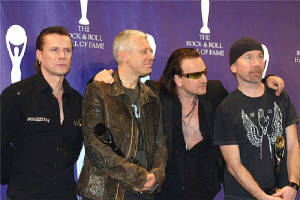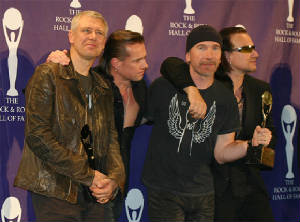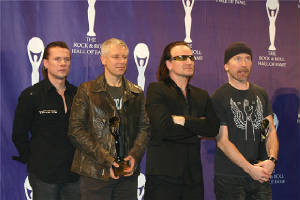|
WWW.U2.COM // Hall Of Fame Speeches // Mar 2005
U2: Rock & Roll Hall Of Fame speeches
March 2004

Bono: Born in the USA, my arse. That man was born on the north side of Dublin.
Irish. His mother was Irish. The poetry, the gift of the gab, isn't it obvious? In fact, I think he's tall for an Irishman.
It's an Irish occasion this evening. Paddy Sledge, the O'Jays -- they're a tribe from the west of Ireland. This is
a bit of an Irish wedding. The Rock and Roll Hall of Fame is a bit of an Irish wedding -- beautiful girls, beautiful frocks,
fights in the bathrooms, managers and clients again, lawyers with bloody noses. It's an Irish wedding. It's a great occasion.
I even like it when it gets dirty. I've seen it get really dirty over the years here - that's what rock and roll is,
the sound of revenge. So make your enemies interesting, I would say, ladies and gentleman. But not tonight. When I, when we
look out we don't see any enemies, we just see friends. And this country has taken this band into its bosom all the way. (applause)
It's an amazing thing. Frank Barselona early on, he's a great friend. Chris Blackwell, what an incredible man he was
to have looking after you. Can you imagine your second album -- the difficult second album -- it's about God? Everyone is
tearing their hair out and Chris Blackwell says, "It's okay. There's Bob Marley and Marvin Gaye, Bob Dylan, it's a tradition.
We can get through it. And I think about what Frank Barselona said earlier about long-term vision because you know without
the long term vision of Frank Barselona, Barbara Skydell and Chris Blackwell, there would be no U2 after that second album.
It would have been cut. No "Sunday Bloody Sunday," no "Unforgettable Fire," no "One," no "Where the Streets Have No Name,"
no "With or Without You." That's what I'd like you to take away from tonight. I would like to ask the music business
to look at itself and ask itself some hard questions. Because there would be no U2 the way things are right now. That's a
fact. Only friends out here. But still Rolling Stone puts us on the cover, thank you very much. MTV, VH1 still play our videos.
College radio still believes in our band and makes our band believe in ourselves. It's an amazing place to be inducted in
the Rock and Roll Hall of Fame, feeling like this -- feeling like you've just made your first album. It's a great feeling,
a very special feeling. And I see around friends and people that we've worked with for a very long time -- and generally
I don't do big Thank You speeches because they're boring and why stop a tradition of a lifetime? It's too many people in the
room to thank, but I'd like to thank the really gorgeous women that work for us. Because they're fun to thank. Beautiful,
gorgeous women of Principle Management. Ellen Darst, thank you very much. Sheila Roche, thank you very much. Anne Louise Kelly,
thank you very much. Keryn Kaplan, thank you very much. Beautiful, sexy, sometimes Irish, sometimes American women, thank
you. And lots of bodyguards around here. No bigger bodyguards than Jimmy and Doug. Jimmy Iovine and Doug Morris continue in
the tradition of Chris Blackwell, which is pretty much letting us get away with anything we want. So I want to thank them
very much. I'm trying to think of what else.... The biggest bodyguard of all has to be our manager, Paul McGuinness. You see
him right there. The reason no one in this band has slave scrawled across their forehead, thank you very much. I'm
going to go on and list three Kodak moments over twenty-five years I'd like to share with you. One - it's 1976 - Larry Mullen's
kitchen. About the size of the drum riser he uses now. It's a bright red -- scarlet, really -- Japanese kit and he's sitting
behind it in his kitchen. And he's playing and the ground shakes and the sky opens up -- and it still does, but now I know
why. Cause Larry Mullen can't tell a lie. His brutal honesty is something that we need in this band. Second Kodak
moment. It is 1982. New Haven, I believe. Things are not going very well. There's a punk band onstage trying to play Bach.
A fight breaks out. It's between the band. It's very very messy. Now you look at this guitar genius, you look at this Zen-like
master that is the Edge, and you hear those brittle icy notes and you might be forgiven for forgetting that you cannot play
like that unless you have a rage inside you. In fact, I had forgotten that on that particular night, and he tried to break
my nose. And I learned a great, great lesson that night. You do not pick a fight with someone who for a living lives off hand-eye
coordination. Dangerous, dangerous man, the Edge. Third Kodak moment. 1987. Somewhere in the south. We'd been campaigning
for Dr. King, for his birthday to become a national holiday. In Arizona, they are saying no. We're campaigning very hard
for Dr. King. Some people don't like it. Some people get very annoyed. Some people want to kill us. Some people are taken
very seriously by the FBI. They tell the singer that he shouldn't play the gig because tonight his life is at risk, and he
must not go on stage. And the singer laughs. Of course we're playing the gig. Of course we go onstage, and I'm singing "Pride
(In the Name of Love)" -- the third verse -- and I close my eyes. And you know, I'm excited about meeting my maker, but maybe
not tonight. I don't really want to meet my maker tonight. I close my eyes and when I look up I see Adam Clayton standing
in front of me, holding his bass as only Adam Clayton can hold his bass. There are people in this room who'd tell you they'd
take a bullet for you, but Adam Clayton would have taken a bullet for me. I guess that's what its like to be in a truly great
rock and roll band.

(Makes way for The Edge...)
Bono: He's got a Blackberry. (Edge has his speech on a handheld.)
Edge:
I am, in the end, the technology guy of U2. Which really, all it means is I can fix the printer. You turn it on. I don't tell
them that.
Above all else what U2 have tried to avoid over the last twenty years is not being completely crap. But
next on the list down from that was to avoid being typical and predictable and ordinary. Because it's so very hard to avoid
the cliche´s. Everyone else's of course, but more than that your own. It's hard to keep things fresh and not become a parody
of yourself. And if you've ever seen that movie Spinal Tap, you'll know how easy it is. It's a parody of what we all
do. The first time I ever saw it, I didn't laugh. I wept. I wept because I recognized so much in so many of those scenes.
I don't think I'm alone amongst all of us here in that.
You know, we're all guilty of taking ourselves and our work
way too seriously. And we've all gone to hang out in a hotel lobby like we were doing something really important. But the
reason we're all here tonight is that in spite of all the cliche´s which do exist, you know, rock and roll, when it is great,
it's amazing. It changes your life. It changed our lives. Witness, for instance, tonight. The O'Jays, Percy Sledge, Bo Diddley,
Eric Clapton, B.B. King, Buddy Guy, the Pretenders. I mean, Amazing. Really magic stuff.
People break it down. You
can study it all you want but you can't just dial it up. It doesn't work like that. And as far as U2 goes, I've stopped trying
to figure out how, or more importantly when our best moments are going to come along. But I think that's why we're still awake.
And that's why we're still paying attention. We know in the end, see ... we know that it is magic. And so we end up waiting
around. Like we all do sometimes. Like actors in some Beckett play, just like they did in that movie, in the lobby, waiting
around for some magic to happen. And we've done a lot of that over the years. I have to say.... I've done a lot of waiting
with Bono, with Adam and Larry and Paul for those moments to come along.
And we've had some great people with us during
those times those times. (muffled) Brian Eno, Steve Lillywhite, Danny Lanois, Jimmy Iovine, Nellee Hooper, our great engineers,
Principle Management. The team that was talked about. Flood. Our show collaborators -- Willie Williams and all his team. A
crew of fantastic people. Joe O'Herlihy. Bucky, Jake, Dallas, Frasier who isn't here, Stuart. Incredible people that we couldn't
have come through the last twenty-five years without. And tonight it feels like it's just about half the room has been along
with us on that journey. So I just wanted to say thank you to my family for being so patient. The main guy for showing me
how. The rest of the band particularly, and tonight, you know, all of you for this evening and most of all, I guess, for making
space for me as we always do together for something magic to happen. Thank you.
Larry: I promise I'll be brief.
Thanks for this tonight. We really appreciate it. It's very special. I feel like we've cut the line or jumped the queue along
the way, someplace along the way. And we never would have got out of my kitchen in our town in Dublin had it not been for
people like the Sex Pistols, Television, Roxy Music, Patti Smith. These people are in our rock and roll hall of fame. Thank
you.
Adam: The bass player approaches the microphone. What's he gonna say? I feel bassless. Okay, yesterday,
it was my 45th birthday. That's a fine age to be inducted into the Rock and Roll Hall of Fame. That means twenty-five years
ago we released our first recording. That means twenty-nine years ago we all met and formed our band. Thirty years ago I got
my first bass guitar, or as I thought, a guitar with only four strings. I had no idea what bass was. I had not heard of James
Jameson, Doug Dunn, Jack Bruce, John Entwhistle, or Bootsy Collins. I just needed a weapon and a shield to take on the world.
When we all got together in Larry's kitchen we didn't know about the great traditions of American music. We didn't
know the blues or soul or R&B or country but we did know that together we had a chance to change the world by making a
noise. This was punk and it saved my ass. We needed someone to get us gigs and to pay for demos. We met Paul McGuinness and
he became our manager. Next we needed a record deal. We were turned down by many people until Nick Stewart offered us a deal
at Island Records. This was the start of a long relationship with Island. Many people along the way helped us develop and
grow. Rob Partridge and of course Chris Blackwell. We made three records with Steve Lillywhite, came to America and Frank
Barselona and Barbara Skydell were our U.S. agents. They introduced us to a network of promoters. Ellen Darst and Keryn Kaplan
ran our U.S. office, and they taught us how radio and promotion worked.
As we were learning all this about the music
business, we were also learning about American music and the kind of artists that are honored her by the Hall of Fame. John
Lee Hooker, B.B. King, Hank Williams, Ray Charles, Johnny Cash, Bob Dylan. Now our generation is being inducted and our time
has come to join those we did not know 25 years ago. I hope that in 25 years when this room is full of hip-hop and pop artists
that they will enjoy joining the diverse list of talents that the Hall of Fame recognizes.

It took many people to get this band here tonight and I'd like to thank some of them personally. Paul McGuinness
and Kathy, Anne-Louise Kelly, Ellen Darst, Sheila Roche, Keryn Kaplan, Regine Moylette, Barbara Galvin, Susan Hunter, Trevor
Bowen, Gavin Friday, Chris Blackwell, Anton Corbjin, Steve Lillywhite, Danny Lanois, Brian Eno, Jimmy Iovine, Doug Morris,
Arthur Fogel and Michael Cole, Denny Sheehan, Joe O'Herlihy, Willie Williams, Dallas, Sammy, Stuart and Terry.
But
in the end the people who really got me here tonight and who I must thank for everything I have, are Ali, Ann, Morleigh, Suzie,
Larry, Edge and
Bono. And I'd really like to thank Bruce for what he said, and I fortunately can remember the names of
everybody in the band as well.
Bono: We've about 35 songs to play. Won't be long.
(band plays)
©
U2, 2005.
|



